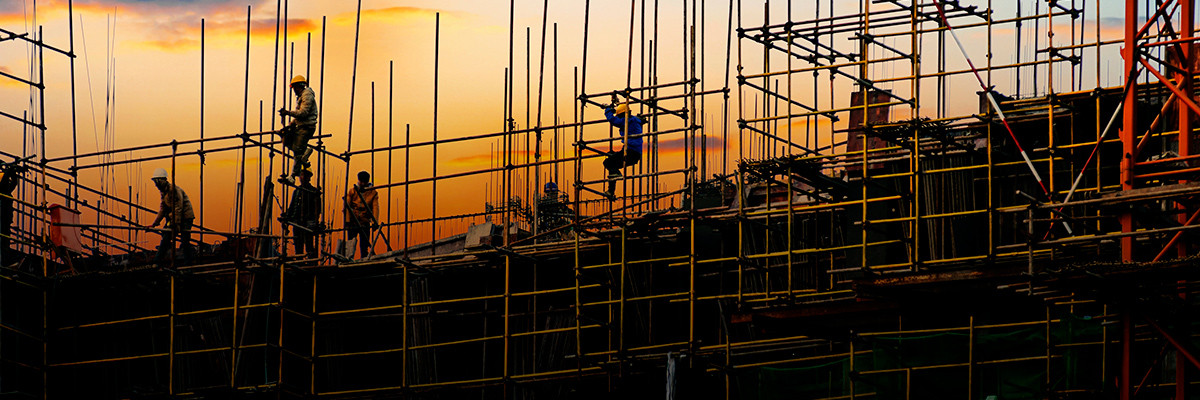
Authors
-
Jean-Baptiste Andrieu
Former Associate Director, BSR
-
Dominic Maes
Former Manager, Communications and Marketing, BSR
The engineering and construction industry, which represents US$8.4 trillion of economic activity, relies on large numbers of low-skilled workers and, as such, is a major provider of formal employment opportunities around the world. In many parts of the world, large real estate and infrastructure projects have fueled a construction boom, attracting millions of migrant workers, especially when there are not enough local workers or the local workforce doesn’t have the skills required.
This rapid growth has given rise to challenges around the rights and welfare of workers, which the media and civil society organizations have highlighted publicly. Other external stakeholders, including clients and governments, have started to increase scrutiny of and define expectations for the actors involved in building infrastructure.
Many companies in the engineering and construction industry have longstanding commitments to the health, safety, and welfare of workers. These companies are keen to expand on their existing programs, policies, and standards to further promote the rights and welfare of workers in their operations and subcontracting chains, even in contexts where the rule of law is limited. Working in isolation, however, means that companies’ impact is limited: Competitors can undermine their efforts to implement commitments and a lack of a forum or other coordinated working environment can hamper their attempts to align on standards and approaches.
For six companies in the engineering and construction industry, this construction boom and associated challenges present an opportunity to incubate and implement a new collaboration on the rights and welfare of workers in the industry. Building Responsibly—an industry-led collaborative initiative facilitated by BSR with support from Humanity United—will enable construction and engineering companies to collaborate around their shared values, advance their programs by sharing best practices, agree on common approaches and standards, develop tools, and engage clients, civil society, and international organizations. Through this initiative, companies can more effectively align with regulations and stakeholder expectations, while increasing productivity and fostering a better environment for workers. As a pre-competitive initiative, Building Responsibly will ensure that companies can engage on mutually beneficial measures and policies in a safe space.
Building Responsibly will focus on three key areas of work relevant to companies in the engineering and construction sector, as highlighted in a recent BSR report.
- Recruitment practices. Recruitment agencies or intermediaries on location continue to lure workers with false promises of high-paid jobs, while charging them high fees to cover the cost of their recruitment. Debts incurred during this process might leave workers in situations of debt bondage, a form of forced labor associated with low or no pay, physical violence, or detention in the country or at work.
- Working and living conditions. While progress has been made on health and safety in larger infrastructure sites, construction remains one of the most hazardous industries in the world. In addition, these workers may experience heat, delays in paying wages, long hours, and lack of workers’ representation, and living conditions in purpose-built accommodations near construction sites sometimes fail to meet international standards.
- Subcontractor and supply chain practices. While large construction companies have the resources and knowledge to implement best practices, subcontractors, a vital component of the engineering and construction industry, might face pressure to cut costs and, therefore, minimize social responsibility efforts.
Companies recognize that these kinds of issues cannot be tackled alone. The six companies at the heart of Building Responsibly are choosing to act on these issues in part because it is sound business practice: Ensuring the fulfilment of human rights in operations and subcontracting chains will become a minimum requirement to win work in the future. However, these businesses are also concerned with what’s morally sound: Millions of workers around the world deserve the opportunity to work in a safe environment where they are respected and where their basic human rights are guaranteed. As businesses are increasingly—and rightly—positioned as moral agents in our societies, anything less is simply unacceptable.
Engineering and construction companies that are committed to respecting the rights and welfare of workers are warmly invited to join this collaborative initiative. One thing is clear: As a global society, we’re not going to stop building. But from now on, we’re going to be building responsibly.
For more information or for membership enquiries, please contact JBAndrieu@bsr.org.
This blog is part of our February spotlight on collaboration. To find out more about BSR’s Collaborative Initiatives, read our overview blog or visit the Collaboration page.
Topics
Collaborative Initiatives
Let’s talk about how BSR can help you to transform your business and achieve your sustainability goals.







